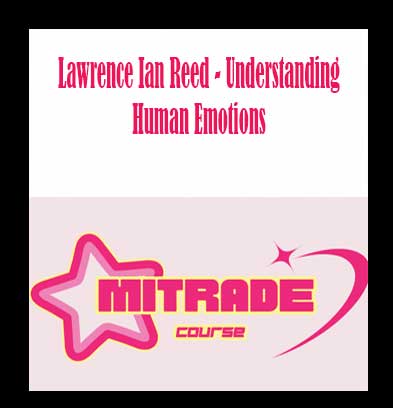Lawrence Ian Reed – Understanding Human Emotions
Description
Understanding Human Emotions , Lawrence Ian Reed – Understanding Human Emotions download
Lawrence Ian Reed – Understanding Human Emotions
Understanding Human Emotions
Consider the importance of emotions in the evolution of humans, with a deep dive into the crucial role of emotion in human survival and success.
LECTURE (12)
1:The Science and Philosophy of Emotions
Men and women have been pondering the definition of emotion for thousands of years. Explore the thoughts of scientists, philosophers, and psychologists from Aristotle to René Descartes, B. F. Skinner to Magda Arnold, and more. Each has added significant concepts to the discussion. But do we have a functionally complete definition, yet? Do we even need one?
02:How Emotions Evolved
Our ancestors had a long list of adaptations to help them survive—facial recognition, mate choice, sleep management, predator vigilance, and much more. But some of those adaptations are mutually exclusive, and how did they know which one to call on in a given circumstance? Explore the phenomenon of natural selection in the development of fear, joy, anger, and disgust as the superordinate programs we rely on today.
03:How the Body and Emotions Influence One Another
Do our emotions originate in the body itself or in the surrounding environment? We know that our autonomic nervous, neuroendocrine, and immune systems are strongly related to our emotions, and we usually think of them as responding to emotions. But if we made changes in those systems, could we create the associated emotions? Learn about the fascinating experiments that have tried to do just that.
04:The Social Purpose of Emotions
Humans are social animals and our best chance of survival comes when we thrive in the social environment. Learn about the affiliative and distancing functions of emotions on our ability to create the social connections necessary for survival. Explore the fascinating games created to test various hypotheses about the effects of emotions on social bonds.
05:Facial Expressions and Nonverbal Behavior
Can you really trust an individual’s outward emotional expression when you’re trying to “read” that person? Explore the fascinating human face, a dual-processing system that can produce both genuine emotional and feigned expressions—from two different neuronal pathways. Discover the possible evolutionary reasons for showing those expressions front and center, on a body part that is so difficult to hide.
06:Self-Conscious Emotions: From Empathy to Shame
Some of our emotions result from an assessment of our own behavior in relation to a particular standard or goal. These evaluative self-conscious emotions include shame, guilt, pride, embarrassment, and hubris. Explore the very detailed and unique physical expressions that tend to accompany these particular emotions—and why.
07:Culture and Emotions
In the Western world, we tend to view our emotions as individualistic; we feel something as a result of our unique body and environment. But for the rest of the world, this idea makes no sense. Most people consider emotions to be interpersonal, and this is the trend among scientists studying emotions now, too. Explore the fascinating ways in which culture affects our concepts, and expression, of emotions.
08:How Children Develop Emotions
We all know that babies do not exhibit the full range of human emotions. Jealousy, pride, shame, guilt, etc. cannot be expressed until later development. But is each baby born with access to the full range of human emotions or are emotional tendencies shaped by family, culture, and peer group? This is one of the central theoretical questions for those who study emotions. Learn about the fascinating theories.
09:The Rational and Moral Sides of Emotions
Throughout the centuries, we have often worshipped the rationality of our cognitive powers. Our emotions, however, have usually been negatively described as irrational. But what if we think our emotions are pointless only because we are in the dark about their goals? Discover why scientists describe emotions as orderly; purposeful; and, yes, intelligent.
10:Emotional Disorders: Anxiety and Depression
While emotional responses are short lived, lasting on a scale of seconds to minutes, and always with an obvious trigger, moods can last days, months, or even a lifetime, and be future-oriented. Explore the mood disorders of anxiety (which can seem unnecessarily excessive) and of depression (which can seem unnecessarily prevalent). How could these disorders have resulted from the process of natural selection?
11:The Purpose of Disgust and Anger
Disgust and anger are complicated feelings. Learn why the latest work by some evolutionary psychologists identify three types of disgust—pathogen, sexual, and moral—and why anger, possibly more than any other emotion, is often attempted to be controlled or mitigated. From an evolutionary point of view, exactly how do disgust and anger work to our benefit?
12:Connecting People: A Focus on Love
We would all agree that love is an emotion. But while we have defined all emotions as being fleeting, this is not a characteristic we really want to attribute to love. Discover the differences between romantic and companionate love. Explore these two types of love from an evolutionary point of view and discover how they can both contribute to our species’ success.
DETAILS
Overview
Most of us would point to the human brain, and the resulting human mind, as the most significant adaptation of Homo sapiens. But there’s at least one more critical tool in our arsenal of adaptions, one that we rarely consider or appreciate as a survival mechanism: our emotions. In Understanding Human Emotions, Professor Lawrence Ian Reed helps us consider our emotions from an evolutionary point of view. Without the full range of our emotions, we simply would not be here.
About
Lawrence Ian Reed
Emotions color our cognitive processes and shape our social relationships. Discover a newfound appreciation for those feelings that underscore the most important moments of your life.
ALMA MATER
University of Pittsburgh
INSTITUTION
New York University
Lawrence Ian Reed is a Clinical Assistant Professor of Psychology at New York University. He received his BS in Psychology and PhD in Clinical Psychology at the University of Pittsburgh, with a dissertation focusing on the effects of guilt on altruistic behavior. He completed his clinical internship at McLean Hospital, a Harvard Medical School affiliate.
Lawrence held postdoctoral positions at Harvard Medical School and Harvard University. During this time, he won two Certificates of Excellence and Distinction in Teaching. He has since taught at Skidmore College, Columbia University, and New York University, where he won the Golden Dozen Teaching Award in 2020. He was also included in the Intro to Psychology course created by Outlier.
In addition to his teaching and research, Lawrence is a psychotherapist and holds licenses in Massachusetts, Maine, and New York. He has clinical experience treating clients across many diagnostic categories, age ranges, and ethnicities. He also specializes in treating adolescents and adults with mood disorders, such as depression and anxiety; emotional disorders, such as borderline personality disorder; and substance abuse disorders. Many of his treatment methods are drawn from cognitive behavioral therapy, dialectical behavior therapy, and motivational interviewing.
Commonly Asked Questions:
- Business Model Innovation: Acknowledge the reality of a legitimate enterprise! Our approach involves the coordination of a collective purchase, in which the costs are shared among the participants. We utilize this cash to acquire renowned courses from sale pages and make them accessible to individuals with restricted financial resources. Our clients appreciate the affordability and accessibility we provide, despite the authors’ concerns.
- Understanding Human Emotions Course
- There are no scheduled coaching calls or sessions with the author.
- Access to the author’s private Facebook group or web portal is not permitted.
- No access to the author’s private membership forum.
- There is no direct email support available from the author or their team.










Reviews
There are no reviews yet.